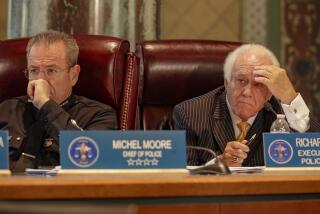L.A. OKs Plan to Improve Cable Service
Los Angeles officials on Friday approved sweeping regulations aimed at giving cable TV subscribers recourse when faced with poor service from their carriers.
The new rules, approved on a 3-0 vote by a city commission that oversees cable TV service, would:
For the record:
12:00 a.m. May 18, 2005 For The Record
Los Angeles Times Wednesday May 18, 2005 Home Edition Main News Part A Page 2 National Desk 1 inches; 40 words Type of Material: Correction
Cable rules -- An article in Saturday’s California section about the approval of new regulations on cable television service in Los Angeles misspelled the name of Jill Novik, a strategic advisor for Seattle’s Office of Cable Communications, as Jill Novick.
* Limit how long customers can be put on hold by a cable company operator.
* Require companies to credit customers if technicians miss appointments or the cable service goes out for more than four hours.
* Require Spanish-speaking operators to be available.
* Give the city the power to fine cable companies as much as $3,000 each time they violate the rules.
Cable providers would be required to compile quarterly reports that detail how they are complying with the new rules. The city would use those reports to determine whether companies should be fined.
The rules will take effect in the next few months unless a City Council member decides to bring them to the full council for a vote.
“I think the subscribers are going to be the real winners as a result of this,” said Dean Hansell, who heads the Board of Information Technology Commissioners. “What we have done is attempted to address the many complaints that we have heard over the years.”
They were drawn up over several years in response to the more than 2,000 complaints a year City Hall receives about cable service. Right now, the city’s only means of punishing a cable company is revoking its franchise -- an extreme action that rarely occurs.
But cable companies are lining up against the rules, saying the directives are burdensome, inefficient and would put them at a disadvantage in competing with satellite TV companies, which are not covered by the regulations because the city doesn’t franchise satellite TV.
Cable and satellite TV are locked in an intense battle for users, and cable providers say the competition is already making their industry better and more responsive.
Deane Leavenworth, president of the Los Angeles Cable Operators Assn. and a spokesman for Time Warner cable, said complaints to the city declined 27% between 2002 and 2003, the most recent numbers available.
“The industry customer service record year after year has shown distinct improvement,” he said. “It’s market-driven.”
Hansell agreed that complaints were down but said they still get far too many of them.
A cable company also criticized a requirement to locate phone service centers in the city. Hansell said the regulation was crafted in response to customers who complained about operators who were unfamiliar with the city.
Out-of-town phone service centers with many operators in one location can offer 24-hour service -- by working in shifts -- and better technical expertise, wrote Thomas Carlock, a lawyer for Adelphia, in a letter to the commission.
Time Warner and Comcast have call centers in the city, but Los Angeles’ other primary provider, Adelphia -- which is in the process of being purchased by Time Warner and Comcast -- operates call centers out of the Inland Empire.
The new rules cover some of the issues that most frustrate cable users. They limit wait times on the phone to 30 seconds and give subscribers an automatic $25 credit if a technician doesn’t arrive during the four-hour appointment window.
Los Angeles is one of several municipalities across the country to consider expanded consumer rights for their cable subscribers. Others include Seattle; Montgomery County, Md.; and Washington, D.C., said Libby Beaty, executive director of the National Assn. of Telecommunications Officers and Advisors, a group of government cable regulators.
“The [cable] industry has continued to rank pretty low in customer satisfaction for a number of years, and that low customer satisfaction translates into complaints made to local governments,” Beaty said. “Constituents are demanding this type of protection.”
Some cities that have adopted the new rules say they have largely been successful. Jill Novick, a strategic advisor for Seattle’s Office of Cable Communications, said cable service in the city has improved dramatically since 1999, when the bill of rights was approved amid complaints about lousy cable service.
As a result, Seattle’s cable subscribers often see better and faster customer service than their suburban counterparts, Novick said.
“What the companies told us is, ‘We take your guys first, and other people [from surrounding cities] will wait two or three weeks’ ” for their cable to be installed, Novick said.
Most of the new Los Angeles cable standards are scheduled to go into effect in January, or 30 days after the city completes its franchise agreements with the cable companies, whichever comes first. The exception is the requirement to locate call centers in Los Angeles, which would go into effect in July 2006.
Some residents who have had unhappy experiences with their cable company applaud the idea of a subscribers’ bill of rights.
Cable technicians missed two appointments to fix Brentwood resident Hue Ng’s premium cable service earlier this year, after her husband took time off work to meet them.
And although she eventually did receive some credit, she had to call back several times to get it.
“We got mad,” said Ng, a lab technician in her 30s who hopes the new protections will improve service. “We cannot keep ... waiting for them.”
Joy Summers has her own complaints. Every four or five days, the retired Westwood resident said, her cable television service would go out, inevitably in the middle of one of her favorite sitcoms.
And forget about calling the cable company to complain. Summers said she would wait as long as 40 minutes to get through to a live operator, who, she said, would be rude and unhelpful.
“To try to telephone them was like pulling teeth out of a hippopotamus,” said Summers, 78.
At one point, though, she just had had enough with her cable service. Summers purchased a satellite dish, which she has had for 2 1/2 years.
Times staff writer Nicholas Shields contributed to this report.
More to Read
The biggest entertainment stories
Get our big stories about Hollywood, film, television, music, arts, culture and more right in your inbox as soon as they publish.
You may occasionally receive promotional content from the Los Angeles Times.











